INSIDE
ACCESS BANK NIGERIA’S MOVE TO SUPPORT WOMEN IN ENTERPRISE
SOUTH AFRICAN BREWERIES (SAB) CALLS FOR ENTREPRENEURSHIP AS PART OF ESG STRATEGY
THE JOINERY SOUTH AFRICA: COMBINED EFFORTS TOWARD ACHIEVING NET ZERO
EMBRACING AFRICA’S RICH CREATIVE CULTURE AT LAPA
BOITUMELO MARUMO

BOTSWANA CLIMATE CHANGE NETWORK ON LEADING
A CLIMATE ACTION MOVEMENT
JULY - AUGUST 2023 | ISSUE 8
Towards creating a sustainable future in retailing












We are proud to have acted as Original Lender and Sustainability Agent for Shoprite Investments Ltd for their ZAR2 billion Sustainability-linked Loan.
The facility provided is a ZAR2 billion Sustainability-linked Loan with a pricing ratchet linked to the Group’s compliance with various pre-agreed sustainability performance targets. This deal will positively contribute towards Shoprite Group's sustainability goals.

Shoprite Investments (a subsidiary of Shoprite Holdings Group) is a South Africa-based investment holding company. A fast-moving consumer goods retailer, its core business includes food retailing, furniture, pharmaceuticals, hospitality, ticketing, digital commerce, and financial and cellular services.

We are proud to partner with our clients in creating sustainable and value-creating solutions, thus enabling economic activities that create shared prosperity for current and future generations.



cib.absa.africa





























Corporate and Investment Banking
The bravery to imagine and the will to get things done. That’s Africanacity.
Authorised Financial Services Provider Registered Credit Provider Reg No NCRCP7

THE RESPONSIBLE CITIZEN MAGAZINE is an industry stalwart supporter in profiling successes in organizational CSI/CSR policy across multiple industries, bringing to the fore an informative and educational approach to showcasing the individuals and institutions driving sustainable practices in business, entrepreneurship and community development. Ours is a development and non-controversial publication which also provides good reference material that can be used by policy makers, academics and professionals. To feature your CSI mission and advertise your business with us, contact: Tel: +267 3116813 / 73 329 959 Email: advertising@theresponsiblecitizen.co.bw | marketing@theresponsiblecitizen.co.bw
LEADING IN THE BUSINESS OF CSR
14 | Access Bank Nigeria Pitch-a-ton Program’s Move to Support Women in Enterprise
18 | VWSA Kariega Plant Driving Practical And Sustainable Mobility Forward
22 | The Joinery South Africa: Combined Efforts toward achieving Net Zero
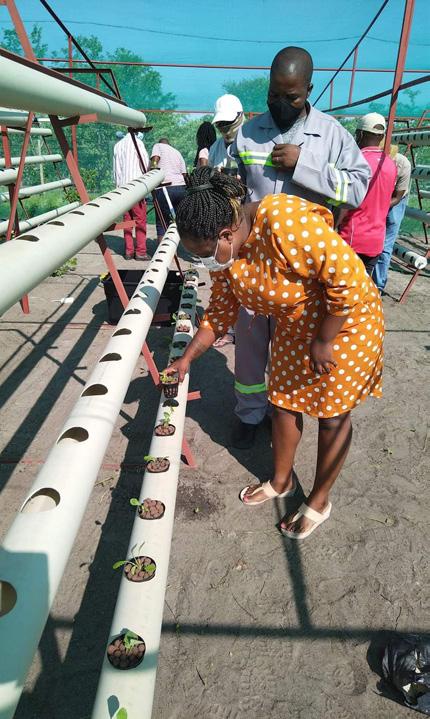
28 | South African Breweries (SAB) calls for responsible drinking & entrepreneurship as part of ESG strategy
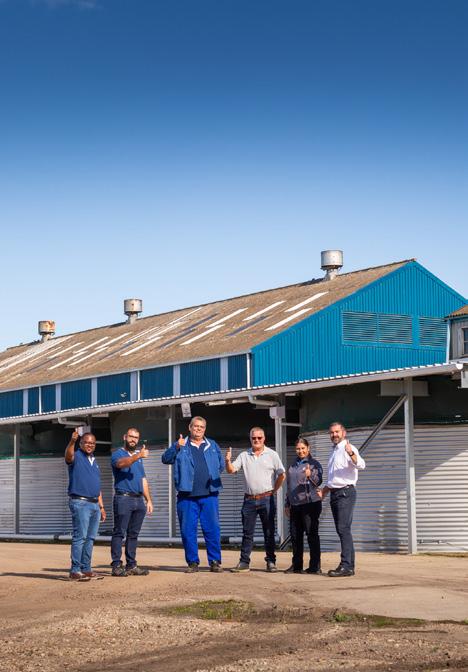
2 | THE RESPONSIBLE CITIZEN | BUSINESS • COMMUNITY • IMPACT Contents 06
Welcome 07
Editor’s Note
| Founder’s
|
08 | Botswana Climate Change Network: Leading A Climate Action Movement
COVER STORY
08 18
COMMUNITY CHAMPIONS
32 | Spotlight on Warren Farrer and the call to action from the DO MORE FOUNDATION
36 | Kenyan-based Tech firm Mr. Green Africa on Revolutionizing Recycling of Plastic Waste
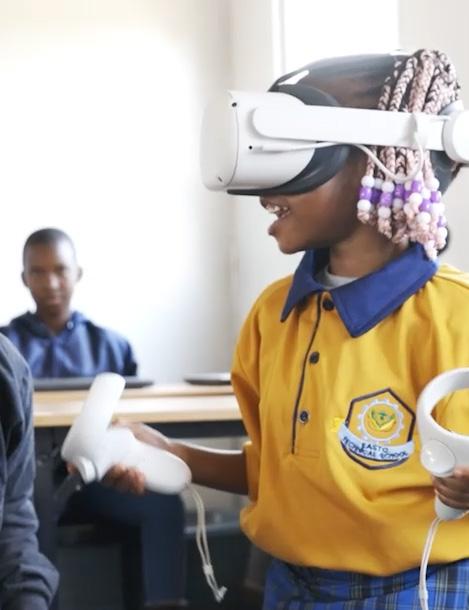
40 | Eco-Tourism: Offering a Serene and Sustainable Haven for Unwinding from the Hustle and Bustle
44 | Chanja Datti: Tackling Nigeria’s waste management challenges one initiative at a time
IMPACT FOR TOMORROW’S GENERATIONS
48 | Takeaways from the Voluntary Carbon Market Auction in Nairobi
50 | Extended Reality Founder, Mmuso Mafisa on representing South Africa for the Creative Business Cup global annual event in Copenhagen
53 | Embracing Africa’s Rich Creative Culture at LAPA
56 | Spearheading Climate Change Agenda through Global Partnerships: A focus on the recently concluded Security Implications of Climate Change Symposium (SICC III)
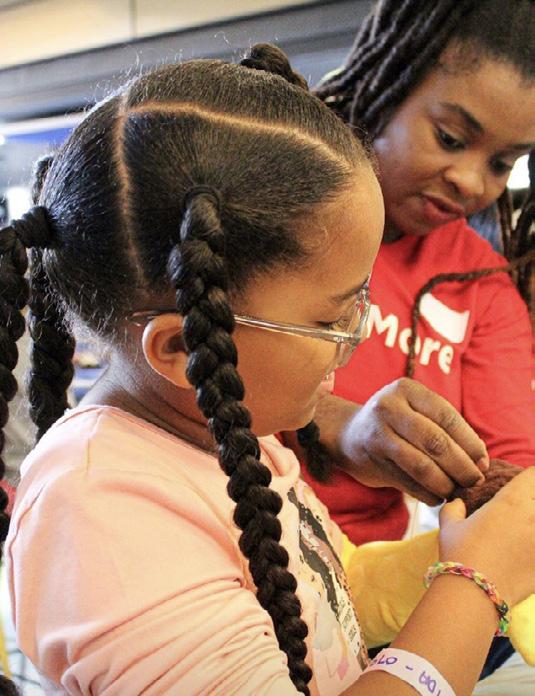
| 3 THE RESPONSIBLE CITIZEN | BUSINESS • COMMUNITY • IMPACT JULY - AUGUST 2023 • ISSUE 8
32 50
EDITORIAL
Founder and Editor
Mpho Moletlo Kgosietsile Managing Director of Wise Leadership (Pty) Ltd mkgosietsile@wiseleadership.co.bw Editor
Yvonne C Mtengwa Narratives PR FZ-LLC Dubai, UAE yvonne@yournarratives.com
CONTENT CONTRIBUTORS
Lorraine Kinnear
Bem Abubaker
Zimkhita Kweza
Peter Kinuthia Murimi
Busiswa Lutshaba
MARKETING & ADVERTISING
advertising@theresponsiblecitizen.co.bw marketing@theresponsiblecitizen.co.bw
CREATIVE DIRECTION
Lucy Nkosi hello@lucynkosi.com
@trcbotswana
@TRCMagazine
@theresponsiblecitizen
@theresponsiblecitizenmagazine
4 | THE RESPONSIBLE CITIZEN | BUSINESS • COMMUNITY • IMPACT
Published by Narratives PR LLC – FZ Registered at Ras Al Khaimah Economic Zone (RAKEZ) United Arab Emirates JULY - AUGUST 2023 • ISSUE 8
At Narratives PR, we are committed to helping African owned corporate, consumer and personal brands connect with their audiences across the continent! We are all about curated storytelling for impact and awareness of your brand in Africa and the Middle East.
OUR SERVICES INCLUDE |
• Communications Strategy
• Copywriting & Editing
• Book And Magazine Publishing
• Social media Content Development

• Brand Development & Launch
• Ideation To Launch Programming
• Media Relations
• Event Curation
• Stakeholder Engagement Initiatives
consultation.
NarrativesPR www.yournarratives.com
Contact us on info@yournarratives to schedule your
@NarrativesPR
Founder’s Welcome T

he “E” in the Environmental, Societal and Governance Framework (ESG) is increasingly becoming more prominent as the negative impact on the climate is heightened by business activities. There is an international rallying call to act towards climate change to ensure environmental sustainability for the future. Africa’s charge is to take on an understanding of the climate change agenda and its effects.
This Issue unfolds the African endeavour in adopting climate change policies and initiatives across businesses and organisations. We have a collective responsibility to minimise the effects of climate change as they carry the huge potential of threatening food security and general livelihood of people.
As a nation, Botswana has signed the United Nations Framework Convention on Climate Change which led to the Climate Change Policy and Institutional Framework. The Policy provides a more holistic view on climate change and how it affects diverse humanitarian and developmental factors. Its objective is to incorporate sustainability and climate change into development planning to build resilience and mitigate climate change impact. Africa continues to participate in the international agenda on climate change, having hosted the Conference of Parties (COP) on Climate Change. This has seen Kenya and South Africa come to the fore in hosting this international dialogue, thereby cementing its intention to ensure that Africans do not end up becoming victims of climate change any further than they already are. Africa can and will ensure that its habitat is sustainable to support the immense natural resources, helping enable financial and economic sustainability across the nations.
Sincerely,
Mpho KgosietsileMoletlo
6 | THE RESPONSIBLE CITIZEN | BUSINESS • COMMUNITY • IMPACT
Editor’s Note
The impact of climate on Africa is a topic that continues to garner significant attention, especially post last year’s United Nation’s Climate Change Conference (COP27) held for the first time on the continent, in Sharm el Sheikh, Egypt. Profound and far-reaching is climate change, exacerbating existing human impacting challenges such as high rates of poverty across the continent, food scarcity
and political unrest in some parts, while birthing new ones. A prominent consequence is the increasing frequency of extreme weather events such as droughts and even flooding in some of Africa’s coastal areas. With droughts becoming more frequent, resulting in water scarcity and threatening food security for millions, it ought to be the rallying call for the continent’s diverse populations to appeal to governments as well as the private sector, to take a proactive approach to addressing rampant threats associated with climate change.

In this Issue, we tap into the thinking behind such events as the Security Implications of Climate Change Symposium (SICC III) which took place in Gaborone, Botswana’s capital, and we learn about what role the Botswana’s Climate Change Network is playing in educating the masses on the adverse realities that come with not addressing the cause and effect of climate change. We also connect with entities across the continent, devoting their efforts towards recycling and upcycling for the benefit of humanity and the environment – among other topics.
As we move towards the tail end of 2023 which often signals more conferences and events including the 2023 UN Climate Change Conference which is scheduled to take place in Dubai this year, we at The Responsible Citizen Magazine remain dedicated to showcasing the role of the corporate sector in providing solutions that tackle social challenges, also highlighting the great works of the often-unsung heroes within our communities. A special thank you to our readers for staying the course with us!
Yours truly,
| 7 THE RESPONSIBLE CITIZEN | BUSINESS • COMMUNITY • IMPACT
YvonneC.Mtengw a
Botswana Climate Change Network:
Leading A Climate Action Movement
 By Lorraine Kinnear
By Lorraine Kinnear
We should all be concerned about climate change as its impact affects all of us. Our world has recently experienced a series of worrying climaterelated events that implore individuals and communities to become proactive about their contribution to slowing the planet’s degradation. At the forefront of this movement is a civil sector player, Botswana Climate Change Network (BCCN), and to delve deeper into the work of this Network, The Responsible Citizen conversed with the organisation’s Public Relations and Communications Officer, Boitumelo Pauline Marumo.
The Botswana Climate Change Network is a non-government organization that was formed to strengthen citizen participation in environment and sustainable development programs, with a specific interest on the climate change agenda. The overall objective of the Network is to create an interface between marginalized and non-marginalised communities through employment creation, improved information and knowledge sharing, support provision, networking, and advocacy in addressing climate change, environmental management,
and energy for sustainable development.
BCCN maps and locates needs within the national framework of policy formulation, working with relevant ministries and authorities to respond to the identified needs. They work to also encourage citizens to be active participants and movers of policy formulation processes.
The Network thrives to ensure that people from different walks in Botswana are equal recipients and beneficiaries of effective policies. The formulation of a people-centered agenda enables everyone to focus on issues affecting them, mobilising each other to address problems as they contribute to societal developments.

| 9 THE RESPONSIBLE CITIZEN | BUSINESS • COMMUNITY • IMPACT COVER STORY • BOITUMELO PAULINE MARUMO
Partnerships for impact at BCCN
Botswana Climate Change Network has over the years created a network of partners at the national and regional levels with whom it collaborates with for specific projects and advocacy initiatives. Since its inception, the organisation has been engaged in various advocacy and demonstration projects in the country. BCCN has previously carried out demonstration projects on climate-smart agriculture in partnership with Somarelang Tikologo. Furthermore, the Network engaged women small-scale farmers in Kgatleng and Central Districts on resilience and resilience capacity building initiatives, as well as exchange programs in collaboration with Earthlife Africa (South Africa) and Oxfam (Kenya, South Africa, and Botswana), CARE International, and United Nations Women Southern Africa.
The Network is currently implementing the Guard Africa Project funded by the Swedish International Development Agency, and the International Climate Initiative (IKI) project funded by the German Federal Ministry for the Environment, Nature Conservation and Nuclear Safety. Such initiatives have been inclusive of youth, village development committees, and local communities. This inclusive approach is important for the organization, as these groups of people can carry out the required advocacy for the climate change agenda.
BCCN also participates in the UNFCCC climate change negotiations and Africa Climate Talks. Members of the Organization have been participating in regional and global climate talks since 2011. And through the organisation’s collaboration with regional bodies such as the Pan Africa Climate Justice Alliance (PACJA), members can track and advise on policy, fulfilling their role as resource persons in effecting policy formulation and implementation.
Members of BCCN have previously benefited from the training offered by various partners, such as the Cohort 3 of the Nairobi Summer School on Climate Justice by the PACJA, where Boitumelo Pauline Marumo was one of the 2 Batswana selected for an in depth 2-week capacity building program. This training ran from 2 to 15 July 2023 at the Kenyatta University in Kenya.
Project milestones at BCCN
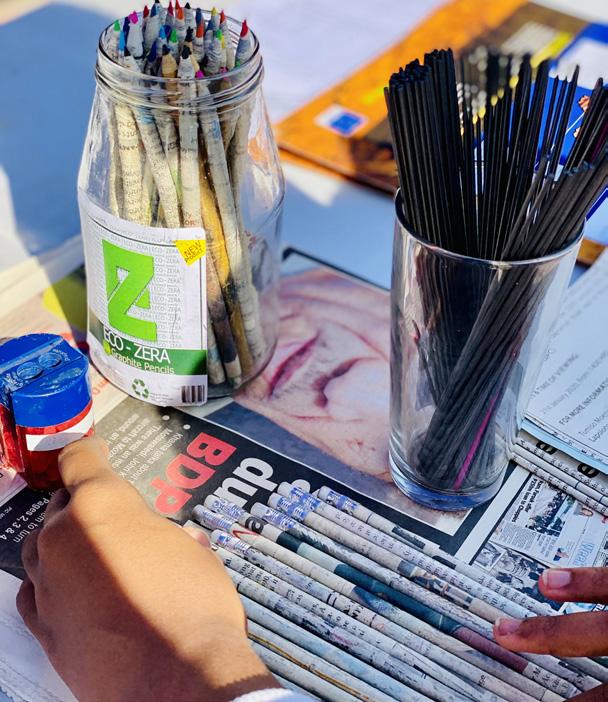
Key projects that are being undertaken in Botswana by BCCN include the implementation of the Greening Women Enterprises: Decentralised Renewable Energy Products and Services project, which is being funded by the United States Embassy. This project covers capacity building programs for grassroots women in Botswana, Lesotho and eSwatini. Women participants from this project are equipped with skills to run their small business in a sustainable manner, to incorporate circular economy principles in their daily activities and they also receive training on the use of renewable energy products.
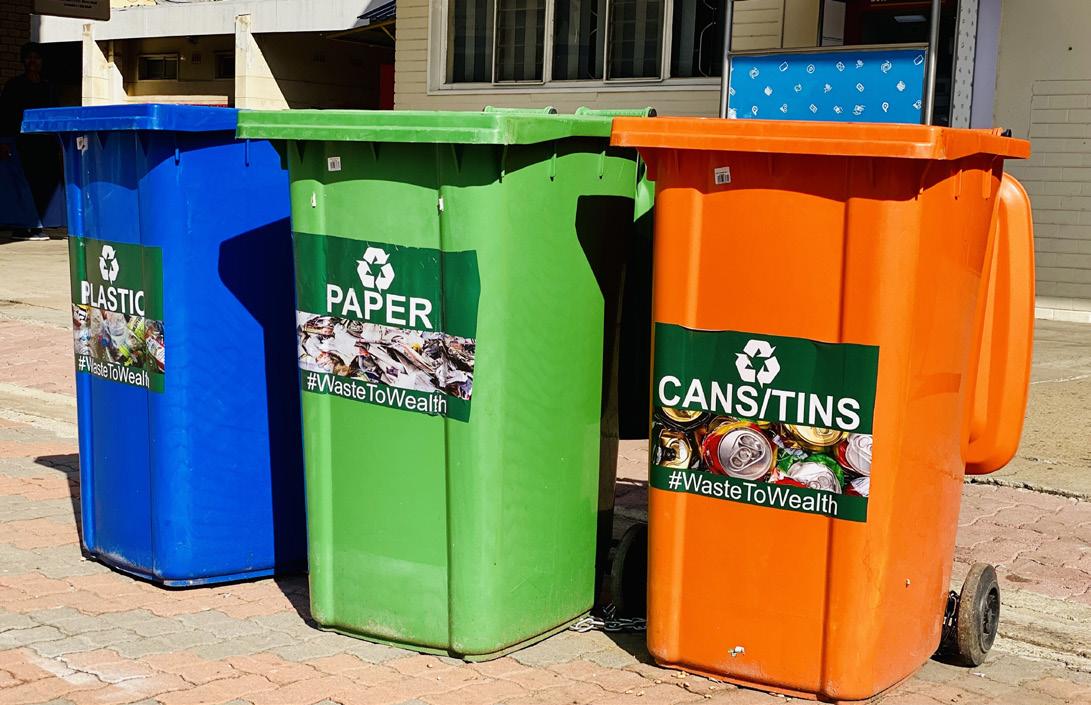
10 |
The Enhancing Innovative Initiatives for Adaptation Through Demonstration of Self Powered Agro-Photovoltaic Vertical Hydroponic Liquid Compost System in Communities Within the Makgadikgadi Framework Management Plan, also known as the Gweta Project, is funded by the United Nations Development Program (UNDP) GEF Small Grants Fund. It aims to empower 120 community members from 9 villages in the Makgadikgadi area by introducing opportunities in climate-smart agriculture. The project also aims to improve community members’ professional and entrepreneurial capacity to pursue opportunities in the agricultural sector, while facilitating the development of a network of partners.

The Network through its online platforms and media partners provides climate change information, education, and communication though the use of blogs, articles, research papers and real time sharing of global news in relation to the planet. This is in efforts to provide contextualised information, which is relevant to Botswana and explains in simple terms, the negative impacts of climate change experienced by the country, the approach to combatting threats, and global mitigation and adaptation measures.
Raising awareness through recognition of efforts
The BCCN makes it a point to honour global commemorations such as the World Environment Day. In 2023, BCCN recognised the companies involved in circular economy practices by hosting a #BeatPlasticPollution exhibition at the Main Mall, Gaborone. This event was graced by Enviro Recovery Botswana, a company that specialises in collecting plastic waste to manufacture materials such as plastic chairs, as well as Eco Zera Pencils, a local company that produces graphic pencils made from recycled paper. Some projects are implemented in rural Botswana that teach local communities about their role in climate action.

“Our tree planting and reforestation initiatives allows us to collaborate with local communities such as Good-

COVER STORY • BOITUMELO PAULINE MARUMO
hope and Medie to plant trees in efforts to help combat deforestation, enhance carbon sequestration and promote biodiversity conservation,” Boitumelo shared.


Moving ahead towards a productive future in fostering community involvement

BCCN plans to continue the efforts with all current partners through various activities, most of which are named above. The Network will continue to host workshops and training programs to educate members and the general public about climate change impacts, adaptation strategies and mitigation techniques. Through online platforms and media partners, BCCN conducts public awareness campaigns to spread the message about the importance of climate action.
Furthermore, the Network is implanting community resilient projects for community-based climate change adaptation in vulnerable areas. This involves supporting sustainable livelihoods, promoting access to services, and enhancing readiness and response to climate change impacts. Through the power of storytelling and sharing lived experiences, Botswana Climate Change Network is also to publish a series of stories through an online booklet called African Women’s Voices. Through this initiative, BCCN is collecting stories from women in Africa who are involved in climate action and those affected by climate change.
The Network has noted several activities left in their 2023 calendar such as the World Habitat Day commemoration, which will have a series of workshops at local schools created for climate change awareness. They urge communities and individuals to engage with the Network across social media platforms, subscribe for membership and practice sustainable living in our daily lives and communities.
“We all have a responsibility to protect our planet, efforts, no matter how small all add to a collective great effort,” urged Boitumelo. “As the Botswana Climate Change Network, our passion and dedication lie in forging a resilient future for Botswana in the face of climate change. Through our collective efforts, we strive to raise awareness, drive action and foster collaboration among diverse stakeholders, such that together we can create a greener, more sustainable Botswana, ensuring a harmonious coexistence between nature and communities for generations to come,” she added.
12 |
Empowering Botswana's Youth to Combat Climate Change: Join the Local Conference of Youth 2023




As the world grapples with the ever-increasing threats of climate change, there is a glimmer of hope shining from Botswana as the Local Conference of Youth (LCOY) gears up for its landmark event in 2023 With a resolute mission to empower young minds and instigate climate action, the LCOY Botswana is calling on the nation's youth to step up and make a difference.
Set to be held on the 29th and 30th of August 2023 at the prestigious University of Botswana, the LCOY Botswana aims to create an unparalleled platform for young people to engage in workshops, panels, and discussions surrounding climate change. Under the theme "Enhancing for Sustainable Development in Botswana," this gathering is a crucial s of our youth in the battle against climate crisis
The significance of this event cannot be overstated. Organized by este Shapers Community - Gaborone Hub, Sustain267, Green Habitat Botsw Change Network, the LCOY Botswana stands as a beacon of hope for it is aligned with the Youth Climate Movement or International Youth Cl an endorsement from the United Nations Framework Convention on Cl
Pato Kelesitse, the chair of the LCOY organizing committee, expresses excitement and anticipation: "We are thrilled to be hosting the LCOY Botswana in 2023. This event is a unique opportunity for young people come together and learn from each other about climate change. We h that the LCOY will inspire young people to take action on climate chan and make a difference in their communities "
The LCOY Botswana represents not just an event but a movement a movement led by the youth, for the youth It is an endeavor to amplify t voices and ideas of young individuals who will inherit the consequence climate change. By providing them with an avenue to network, collabor and share knowledge, this conference seeks to nurture the next generation of climate activists and leaders
The LCOY Botswana stands as a testament to the collective responsibility we share to safeguard our planet for future generations Together, let's embrace this momentous opportunity and shape a brighter, greener future for Botswana.

Join us at the LCOY Botswana 2023, where the potential of our youth will meet the urgency of our planet's needs For more information and registration, please email globalshapersgc@gmail.com or botsccn@gmail.com.
Let's unite as one in the fight against climate change, and together, we can forge a sustainable and resilient future for Botswana and beyond.

LCOY 2 0 2 3 H O S T E D B Y
B O T S W A N A 2 L O C A L C O N F E R E N C E O F Y O U T H
WE ARE HOSTING...
ACCESS BANK NIGERIA PITCH-A-TON PROGRAM’S Move to Support Women in Enterprise
By Bem Abubaker
Though the pursuit of financial compensation for solutions and services remains a fundamental driving force behind business formation, it is important to acknowledge the crucial role that growth and expansion play in ensuring long-term success. To achieve their objectives, businesses often engage in strategic partnerships or seek funding from a variety of available resources. However, the ability to develop a comprehensive operational structure that can effectively keep a business in motion remains a significant challenge for a lot of owners and is often a crucial factor in determining their longevity and ultimate success.
Access Bank Nigeria, a prominent financial institution, has since 2019, taken a proactive approach to supporting business owners with its "Womenpreneur - Pitcha-ton" program. Since launching, this initiative addresses challenges faced by female-owned businesses, after having discovered through a survey, reasons behind startup businesses failing within the first two to five years of existence. As results indicated that many businesses collapse due to a lack of proper structure, business management skills, and access to finance, The W Initiative by Access Bank acknowledged these gaps and introduced the Womenpreneur Pitch-a-ton program, a multifaceted program
designed for female-owned SMEs.
The program comprises an eight-week "Mini MBA" capacity building training, developed in partnership with the International Finance Corporation (IFC). It also includes a pitching competition that offers various grant prizes, with the goal of this initiative being to empower female entrepreneurs with the necessary skills and resources to grow their businesses and achieve success.
The mission is to bolster the advancement of women-owned small and medium enterprises (SMEs) throughout Africa by providing them with financial grants and transformative business support skills, enabling them to scale up and expand their operations. Robust capacity building and networking opportunities are also made available to women, with a focus on advocating for economic empowerment of SMEs among financial institutions within the women's segment. This initiative offers innovative solutions that go beyond the traditional hand-holding
THE RESPONSIBLE CITIZEN | BUSINESS • COMMUNITY • IMPACTLEADING IN THE BUSINESS OF CSR BUSINESS • COMMUNITY • IMPACT
approach, with tailored quality financial and non-financial options that create an enabling environment for businesses to grow beyond their limitations.
At its inception, the program empowered fifty female entrepreneurs with complimentary access to a Mini-MBA program, while the top three finalists were awarded business grants. In light of the COVID-19 pandemic, the program pivoted to incorporate the use of technology, which led to its expansion into seven additional African countries including Ghana, Rwanda, Zambia, Sierra Leone, Gambia, DR Congo, and Mozambique. The number of grant winners was also increased to five female owned businesses.

In 2021, the Mini MBA program witnessed a significant surge in the number of women who enrolled, with a remarkable 100% increase. The program trained and equipped a total of 100 female business owners while also awarding well-deserved grant prizes to worthy winners. The following year, the program underwent an expansion, with an increase in the number of grant recipients from 5 to 7 winners. Fast forward to the present, the program's fifth edition is currently underway, having opened calls for applications
on June 26, 2023, and closing on August 11, 2023. This year’s edition is poised to train 120 female business owners and make available grant prizes to 10 winners, with an additional 20 consolation prize winners.
IMPACT AND SCALING WITH THE WOMENPRENEUR PITCH-A-TON
The Womenpreneur Pitch-a-ton has yielded an impressive array of 320 International Finance Corporation certified Women Small and Medium Enterprises (SMEs), accompanied by the receipt of grants of up to $100,000. Presently, this program is highly sought-after, with women in business eagerly anticipating its annual occurrence, demonstrated by the influx of thousands of applications each year.
The program attains its greatness through the in-depth business courses it offers, the caliber of its facilitators, the constructive relationships forged through networking, and the unwavering support of its business coaches. To qualify for the esteemed Mini MBA program, an enterprise must satisfy
| 15 THE RESPONSIBLE CITIZEN | BUSINESS • COMMUNITY • IMPACT ACCESS BANK
the primary requirement of having a female majority ownership of at least 50%. However, other essential factors are considered during the selection process. These include an innovative value proposition for the business, proper registration with regulatory bodies, a minimum of one year of operation, and a positive social impact. Upon completion of the program, finalists present their ventures to an impartial panel of distinguished industry and financial experts from diverse sectors.
These judges adhere to a rigorous evaluation framework to determine recipients of our esteemed grant prizes. Throughout the five years of operation, a lot of testimonials from participants, detailing significant improvements across a variety of key performance indicators has been witnessed. These include an impressive 200% increase in product and business visibility, leading to stronger brand recognition and the acquisition of new clientele in international markets such as Cabana, New York, and London. Additionally, business owners have reported a remarkable 300% increase in production capacity, liquidity, and revenue, as well as a substantial 150% growth in their client base.
CAPACITY BUILDING FOR PROGRAM PARTICIPANTS
The program has also enabled participants to secure grants for new equipment and expand their operations with a 50% increase in outlets and staffing, among other notable achievements. Partnership with the International Finance Corporation provided a lot of credibility for the program when they launched, which set the ball rolling for a well-structured program. Access to their wide pool of IFC master trainers helped to solidify the quality of the training and practicable knowledge passed across to the participants.
UNEARTHING THE FOUNDATIONS
The W Initiative is the foundation of everything. Access Bank commits to offering African women with innovative solutions designed to support their financial and lifestyle needs across the continent. With a mantra to inspire, connect, and empower women in the markets, the W initiative applies a segment-based approach in supporting five key segments: W in Business, W professional, W and Family, W quintessential and Gen Zs. For women entrepreneurs, Access Bank through the W Initiative provides the following:

Access to Finance: The organization has strategically developed one-ofa-kind offerings aimed at empowering female-owned small and medium enterprises (SMEs) to obtain financing at reduced rates and simplified procedures. A few examples of their customized solutions are:
• The W Power Loan: Launched in 2018, The W Power Loan is a discounted financing scheme aimed at bridging the financing gaps faced by women in business due to barriers such as huge collateral requirements and complex documentation. The loan can be used for expansion, working capital or purchase of equipment.
• W Power Vehicle Loan: A discounted financing product for women in business to access funding for the acquisition of vehicles for business purposes. This product was designed to address the logistic issues encountered by female owned businesses.
• Instant Business Loans: This is a digital loan product where women-owned SMEs can access funds through their mobile phone using the Quick Bucks app.
16 | THE RESPONSIBLE CITIZEN | BUSINESS • COMMUNITY • IMPACT
ACCESS BANK
Access to Market: Typically, African businesses, especially women-owned SMEs struggle with lack of visibility and low clientele. Through the W Community businesses gain visibility and access to a wider range of customers through channels like trade fairs and exhibitions, e-commerce platforms and free business spotlight.
Access to Capacity Building: Here, women gain access to free training and resources that can help their businesses thrive. Apart from the Womenpreneur Pitch-a-ton program others capacity building opportunities available are the W webinars, W session in Branches, Ladies let’s Drive etc.
Access to Network: Participants also enjoy networking opportunities for women which has resulted in impactful partnerships and collaborations. Example of such is the International Women’s Day conference. The W Initiative boasts a global community, W Community with a strong membership of over 200,000 women across all platforms including web, social media, and other virtual platforms. It is a noteworthy African online community for women to share information, network and enjoy privileges that enhance their lifestyle. Through the virtual community platforms, opportunities to advertise products and services exist, which have translated into better sales have partnerships, and collaborations. The program is championed by Executive Management and Board members from inception till now, which has ensured continuity and growth of the program offers. It has become a household name within the Bank.
Furthermore, a strong alumni network is maintained that allows all previous beneficiaries of the program to connect, support and collaborate amongst themselves. The immense value received by these women have made them strong advocates for this program as they look forward to future winners emerging from the Womenpreneur Pitch-a-Thon which has created a sense of attachment towards the program.
With the numerous successes achieved thus far, it is no doubt that the Womenpreneur Pitch-a-ton program is here to stay as Access Bank is committed to playing a pivotal role in promoting and developing the well-being of women in all aspects of life.


| 17 THE RESPONSIBLE CITIZEN | BUSINESS • COMMUNITY • IMPACT
VWSA Kariega Plant Driving Practical And Sustainable Mobility Forward
 By Zimkhita Kweza
By Zimkhita Kweza
It is no secret that the automotive world has not been historically linked to sustainability and environmental preservation. Rather the opposite has been true with the transport industry reportedly contributing 14% to the world’s greenhouse emissions. On top of the fact that most vehicles require already strained fossil fuels to operate, the production process makes use of large amounts of energy, metals, plastics and toxins, all contributing towards creating a large carbon footprint.
18 | THE RESPONSIBLE CITIZEN | BUSINESS • COMMUNITY • IMPACT

| 19 THE RESPONSIBLE CITIZEN | BUSINESS • COMMUNITY • IMPACT VWSA KARIEGA PLANT
However, a recent survey by SAP and Oxford Economics found that executives are beginning to close the gap between goal setting and taking meaningful actions to increase sustainability in their supply chain processes. The survey speaks on the shifting of attitudes and maturing views with regards to sustainability in the product making process and VWSA is a perfect example of this shifting of gears!
VWSA Kariega Plant
The Volkswagen Group South Africa (VWSA) plant is located in Kariega, an industrial town around 750 km east of Cape Town and 1 000 km south of Johannesburg. With over 3 500 employees, VWSA is the largest private employer in the Nelson Mandela Bay metro where it is located. The plant, which has been building Volkswagens since 1951, stretches over 518 378m² and produces 710 vehicles per day. Apart from manufacturing engines, the Kariega plant currently builds the Polo Vivo and Polo and is the sole manufacturer of the Polo GTI.
Sustainability Initiatives
In order to reduce their environmental footprint in the Kariega Plant, VWSA has implemented multiple projects to reduce their reliance on municipal fresh water, and electricity, reduce their carbon emissions and divert waste from landfill. The corporation’s goal is to achieve a Zero Impact status across all their sites by 2050.

Wastewater Recycling
As part of their “Zero Water Roadmap”, a wastewater recycling facility has been constructed which recycles production-related wastewater from various production areas, for reuse in certain production processes. The project aims to reduce freshwater use at the Kariega site by up to 26%, relevant practice in times of growing water scarcity.
The company says that rainwater harvesting has also become an integral part of the efforts to decrease municipal water usage. The first of a series of rainwater harvesting projects, having 200kl in storage and automated distribution to multiple use-areas, was implemented in 2022. 2 393 kl of rainwater has been used within the last year.
Solar panels
Decarbonisation is one of the company’s key objectives and the corporation says it is determined to become 100% carbon-neutral in production operations by 2030. In 2022 the company installed a total of 3 136 solar photovoltaic panels, which generate 1.5 MW of renewable, carbon-neutral energy. The panels, installed on the roof of the Final Assembly building, reduces VWSA’s carbon
emissions by an estimated 2 500 tons of carbon dioxide per year. At full capacity, the panels produce an estimated 2 500 MWh per annum, producing enough energy to cover between 3% and 3.5% of the plant’s electricity requirements. Further renewable energy projects are in the pipeline.
Plastic use reduction
Production Director at VWSA, Ulrich Schwabe says that plastic pollution is increasingly becoming a point of concern and that the company is on a quest to get suppliers and customers to rethink plastic usage and disposal.
“We are striving to reduce plastic waste and we are working with our employees and suppliers on finding solutions to reduce plastic packaging in which our parts are
20 | THE RESPONSIBLE CITIZEN | BUSINESS • COMMUNITY • IMPACT
shipped by at least 5% by the end of 2023,” added Schwabe.
Since January this year (2023) VWSA has already reduced plastic packaging by more than nine tons. “We continue to work with suppliers to find alternative packaging and further reduce once off plastic usage without compromising the protection of our parts,” said Schwabe.
Diverting waste from landfill is one of several initiatives which VWSA drives to improve the overall environmental performance. Overall, the company is reporting 23% less waste sent to landfills in 2022 and has recycled 94.6% of its waste within the same year.
Commitment to preservation of Biodiversity
In 2021 VWSA embarked on an ongoing bio-diversity roadmap, starting with a project to replace alien plants and trees within
the Kariega premises with indigenous, water-wise plants. On Earth Day 2021 VWSA planted Spekbooms in the shape of the company logo which spans over 1 600m² at the facility in Kariega. Spekbooms are known for its ability to absorb large amounts of carbon dioxide. Once fully grown, this logo could absorb up to 2, 5 tons of CO2 per year. In 2022 over 4800 additional Spekbooms were planted at their Kariega sites, including a “carbon bank”, as well as at schools within the local community.
Boasting over 53% improved natural resource efficiency and reduced environmental impact since 2010, it is no surprise that VWSA has taken first prize in the Eastern Cape Exporter of the Year’s environmental award for 3 years running.

| 21 THE RESPONSIBLE CITIZEN | BUSINESS • COMMUNITY • IMPACT VWSA KARIEGA PLANT
THE JOINERY SOUTH AFRICA: COMBINED EFFORTS TOWARD ACHIEVING NET ZERO
By Lorraine Kinnear
According to the Ellen Macarthur Foundation, a United Nations Environmental Program (UNEP) partner, a truckload of unwanted textiles is disposed of or burned every second somewhere on the planet. In the meantime, it is thought that individuals are purchasing 60% more clothing and wearing it for 50% less time. Textiles and other plastic fibres are causing pollution oceans, freshwater bodies and the atmosphere.
Although the environmental costs of fast fashion are increasing, scientists argue there is another way: a circular economy for textiles. Implementing and aligning to this circular economy, an organization hailing from South Africa, The Joinery, is building a legacy of sustainable practices both from environmental and social perspectives.
Co-founded by Natalie and Kim Ellis, The Joinery is a sustainable and ethical product design brand based in
South Africa. Their principal priority is finding solutions for environmental and community issues through design. The organisation lives by a simple motto that, "We believe in being kind to our planet and fair to our people, one plastic bottle at a time." The Joinery is on a journey to ensure that all their processes are as sustainable as possible from beginning to end, from recycled fabrics, through to sustainable packaging, donating offcuts to NGO’s and offsetting their carbon footprint.

22 | THE RESPONSIBLE CITIZEN | BUSINESS • COMMUNITY • IMPACT
HOW IT ALL BEGAN
The brand came alive when the Co-founders Natalie and Kim teamed up to participate in South Africa’s net zero efforts. Before establishing The Joinery, Kim worked for high-end fashion brands in London, such as Burberry and Jimmy Choo. Natalie worked at the intersection of art, design and media, directing a film on William Kentridge.
“Our career paths may seem quite different, but they granted us unique insights into the luxury market and South Africa's creative economy,” responded the duo. They also reflected that their father was an entrepreneur who worked in clothing manufacturing in South Africa during the 1980s and so as children, Natalie and Kim spent a lot of time in the factory, witnessing the entire production
process, from design to the physical making of the clothes. This experience instilled in a passion for making and a deep appreciation for the art and craftsmanship involved in creating beautiful objects.
TRC: What inspired The Joinery to embark on this current movement?
TJ: We launched The Joinery in 2011 with the aim of creating a sustainable fashion label and uplifting highly skilled workers who had been affected by the downturn of the manufacturing industry. We had noticed a lack of sustainable fashion brands in the South African market and wanted to address this issue by providing consumers

| 23 THE RESPONSIBLE CITIZEN | BUSINESS • COMMUNITY • IMPACT THE JOINERY SOUTH AFRICA
with a sustainable alternative. As we developed our expertise and expanded our offerings, we conceptualised a sustainable fabric from recycled plastic bottles which we then called Future Felt™. We started to explore the potential of Future Felt™ for use in our product design and corporate gifting and hospitality lines, which led to the expansion of our business into those areas. Our vision to re-purpose waste into our Future Felt™ fabric has led us to create handcrafted travel, tech and interior ranges. We continue to be motivated by individual and industry support. And in turn, we can help businesses offset their plastic footprint.
TRC: What are the core activities of The Joinery?
TJ: Sustainable Textile Innovation: We have partnered with some incredible local manufacturers to create our Future Felt™ and Future Tex™ fabrics, both which are made 100% from recycled waste products.


Product Design and Manufacturing: At The Joinery, we design and manufacture a range of sustainable products, including travel and tech accessories, hotel amenities and home goods. We have an in-house team of talented Artisans and continue to prioritise quality craftsmanship, while up-skilling our team of Crafters. Furthermore, we are steadfast on ensuring that all of our products are ethically produced and environmentally friendly.
Collaborations and Partnerships: We’re proud to collaborate with various businesses, brands, and organisations to create custom sustainable products and promote their sustainable practices. We have worked with renowned companies like Polo, LVMH, and Relais & Châteaux, together with these partnerships creating a sustainable impact, and in exchange, helping businesses offset their plastic use.
TRC: Who are the key players in your organisations?
TJ: Our name, The Joinery, is based on our founding principles of collaboration. We aim to join up with like-minded artisans, businesses and forward thinkers who are committed to promoting sustainability.
Our key players consist of our founders, sisters and leaders, Kim and Natalie, who both play a crucial role in shaping the vision, strategy, and overall direction of the company.
The Joinery's workforce, consisting of creatives, business development specialists and skilled artisans, is integral to the company's success. Our founders being sisters has also allowed us to build a strong sense of family within our business, and we take great pride in creating a company culture that is supportive, collaborative, and inclusive.
We work closely with various partners and collaborators across different industries. These include businesses of all sizes, Hotels, Retailers, Banks and various Corpo-
24 |
rates to mention a few brands, and organisations that share their commitment to sustainability.

At The Joinery, we aim to actively engage with and contribute to our local community. By providing employment opportunities, financial stability, and investing in the training and development of our employees. We have also worked with women’s sewing co-operatives in the past.


TRC: Kindly unpack the process that The Joinery follows in selecting materials, converting them into finished products.
TJ: As The Joinery, we’ve always prioritised sustainability in material selection, considering the environmental impact and aiming to source as ethically as possible. We make every effort to utilise recycled waste as our primary material whenever feasible. For any additional materials, we focus on locally sourced, sustainable alternatives.
Our vegetable-tanned leather gets its colour from a natural dying process, which replaces harsh chemicals with natural tannins derived from plant matter. From
THE JOINERY SOUTH AFRICA
the very beginning, we felt strongly that our business should invest in the rich heritage of African leather artisans. To do this ethically, we make sure that our leather is a by-product of the meat industry.
TRC: Does your organisation have any commitments, milestones you would like to achieve in the foreseeable future?
TJ: The Joinery is committed to making a significant impact on environmental sustainability by diverting plastic waste from local landfills and coastlines. Currently, we are actively working towards our goal of repurposing 1 million plastic bottles. We are proud to announce that we have recently reached the milestone of repurposing 850,000 plastic bottles, bringing us closer to our target. By transforming these bottles into sustainable textiles, we are making a tangible difference in reducing plastic pollution and protecting our ecosystems.

TRC: How do you believe that your mission speaks the SDGs?
We believe our organisational goals align with several of the Sustainable Development Goals (SDGs) outlined by the United Nations.
SDG 12: Responsible Consumption and Production: We believe our commitment to sustainability and ethical manufacturing practices directly contributes to SDG 12. By repurposing plastic bottles and utilising recycled and upcycled materials, we aim to promote responsible consumption and production patterns.
SDG 8: Decent Work and Economic Growth: At The Joinery, our focus on uplifting highly skilled artisans and upskilling locals supports SDG 8. We provide employment opportunities, fair wages, and financial stability to our employees and artisans. By investing in their training and development, we believe we contribute to sustainable economic growth and the well-being of their workforce. We also believe that by removing plastic waste from local coastlines, we align with SDG 14: Life Below Water. And that our collaborations speak to SDG 17: Partnerships for the Goals.
TRC: How do you believe Africa fairs on transitioning to a circular economy?
TJ: Africa, like other regions, encounters both challenges and opportunities in transitioning to a circular economy. Although limited infrastructure and awareness pose obstacles, we remain optimistic. Across many African countries, long-standing traditions of circularity have been practiced due to resource scarcity and frugality. We believe that by tapping into this heritage, circular practices can be reintroduced and embraced by many communities. Africa has demonstrated a receptiveness to innovation time and again. Despite existing challenges, we firmly believe that Africa has the potential to leapfrog and wholeheartedly adopt circular economy principles as an integral part of its sustainable development agenda.
26 | THE RESPONSIBLE CITIZEN | BUSINESS • COMMUNITY • IMPACT



| 27 THE RESPONSIBLE CITIZEN | BUSINESS • COMMUNITY • IMPACT
SOUTH AFRICAN BREWERIES (SAB) CALLS FOR RESPONSIBLE DRINKING & ENTREPRENEURSHIP AS PART OF ESG STRATEGY
 By Zimkhita Kweza
By Zimkhita Kweza
In 2021 the over 100 year’s old beverage producer South African Brewery (SAB) launched its very first Environmental, Social and Governance (ESG) strategy. SAB Corporate Affairs VP Zoleka Lisa said the company’s ESG strategy was built around eight strategic priorities: climate action; water stewardship; entrepreneurship; diversity and inclusion; circular packaging; smart agriculture; responsible consumption; and ethics and transparency.
28 | THE RESPONSIBLE CITIZEN | BUSINESS • COMMUNITY • IMPACT
The company says it is aware of the harmful effects of alcoholic products and how the misuse of alcohol has become a big problem for the South African government and the public at large. According to the Medical Research Council of South Africa (the MRC report) drunk driving is one of the biggest threats to road safety in South Africa. Research indicates that 50% of people who die on the roads have a blood alcohol concentration above the legal 0.05 gram per 100 millilitres.
THE 2025 GOAL
SAB’s goal is to lead responsible consumption by measurably enabling responsible communities, responsible driving, responsible marketing and responsible trading. In order to drive this agenda further, the company launched its evidence based responsible consumption platform called SAB Sharp. SAB Sharp is a 5 year (2021-2025) outcome based strategy split into four key pillars namely, Live Sharp, Drive Sharp, Talk Sharp and Sell Sharp. This platform includes the SAB Sharp Charter that consists of a manifesto of SAB’s commitment to championing responsibility which includes a citizen’s commitment that South Africans can sign up to on the SAB website.
LIVE SHARP
The first pillar Live Sharp is committed to empowering
responsible communities that the company does business with through securing and protecting jobs and reducing the prevalence of GBV (Gender Based Violence) in hotspot areas. Programmes under this pillar include supporting over 30 000 businesses across its value chain, uplifting and protecting 2 000 women in at risk communities and training over 100 000 men through #NoExcuse (GBV program).
DRIVE SHARP
The goal for this pillar is to help law authorities enforce regulations discouraging drunk driving thus, reducing alcohol related incidents in hotspot areas. One of the ways SAB plans to achieve this is by ensuring that 30% of accused drunk drivers are successfully prosecuted through the Alcohol Evidence Centre (AEC) program.
TALK SHARP
Talk Sharp focuses on the language used in the brand’s marketing content across all platforms and aims to encourage healthy conversations around alcohol use in hopes of reducing issues such as binge drinking. This pillar hopes to drive behavioural change by as little as 5% within targeted group’s pre and post intervention.
SELL SHARP
Responsible trading is detrimental to the reduction of alcohol misuse and issues such as underage drinking, SAB is pioneer-

| 29 THE RESPONSIBLE CITIZEN | BUSINESS • COMMUNITY • IMPACT SOUTH AFRICAN BREWERIES
ing responsible consumption by training and rewarding businesses that promote responsible drinking within different communities.
ENCOURAGING ENTREPRENEURSHIP
In a country with a youth unemployment rate of 32.9% entrepreneurship and job creation has always been at the heart of SAB, the company has invested in entrepreneurs within their value chain, focusing on farmers, retailers and social innovators and empowering women entrepreneurs. The brewery’s 2025 entrepreneurship goal is to support 30 000 small and medium businesses across SAB’s value chain and drive the growth of 15 000 women-owned businesses in townships and rural areas.

“Best of all, 90% of the beneficiaries come from rural areas and 70% are woman with 50% of the beneficiaries being youth. That is the kind of change we are proud to drive in this country that we love so dearly,” says SAB Corporate Affairs VP Lisa.
SAB aims to support over 50 000 businesses across its value chain and ensure they thrive in challenging environments. Formed in 2010 as a B-BBEE transaction, the SAB Foundation was set up as an independent trust able to invest millions of rands to drive entrepreneurship and employment in South Africa. Since then, the SAB Foundation has deployed over R534 million in grand funding, business development support and interest-free loans to 5 229 entities between 2015 and 2022.
The entrepreneurial investment and support is demonstrated through several flagship programmes listed below:
30 | THE RESPONSIBLE CITIZEN | BUSINESS • COMMUNITY • IMPACT
• Disability Empowerment: supporting disabled entrepreneurs and social innovation that improves the quality of life for people with disability.
• Rural Catalyst Programme: supporting strategic farming models and initiatives in areas where there is high poverty.


• Social Innovation Awards: supporting and scaling businesses targeting solutions to social challenges.
• Tholoana Enterprise Programme: investing in entrepreneurs who show the potential and commitment to grow a business and create jobs.
SAB is proud to report its 2021 entrepreneurship achievements that comprised of 5 229 entities supported through the SAB Foundation entrepreneurship programme. This is followed by 85% of Foundation Covid Relief beneficiaries indicating that they would have closed down if they had not received support and 63.8% farmers supported indicated being more profitable as a result of the support received.
“We want to support entrepreneurs on their journey and show our commitment to providing a tangible and sustainable future for all South Africans,” says Lisa.
| 31 THE RESPONSIBLE CITIZEN | BUSINESS • COMMUNITY • IMPACT
SOUTH AFRICAN BREWERIES
Spotlight on Warren Farrer
AND THE CALL TO ACTION FROM THE DO MORE FOUNDATION
By Lorraine Kinnear
The Price Water Coopers’ Workforce of the Future Report forecasts “A Green World” – a world where corporate responsibility reigns supreme and is no longer a nice-to-have, but rather a business necessity. This would be distinguished by a strong social conscience, a sense of environmental responsibility, a focus on diversity and human rights, and a recognition that business has a far-reaching impact. Workers and customers expect businesses to do the right thing for their employees and the rest of the world. Trust is the fundamental currency that underpins both business and employment. Therefore, companies must put their societal purpose at the center of their business strategy and today, organisations are in full swing as they attempt to embrace a world under this thinking.
Warren Farrer is the Foundation Executive of the DO MORE FOUNDATION, which he was instrumental in establishing while serving as RCL FOODS' Corporate Social Investment Executive. Warren holds a Bachelor of Commerce (honours), a Post Graduate Diploma in Business Management, and a Masters of Business Administration. With a marketing career spanning many large South African companies including Dunlop Tyres, BMW South Africa, Lion Match, and Adcock Ingram, Warren particularly prides himself in his 20 years spent at RCL FOODS, the last 13 years of which he has been responsible for CSI and more recently, heading up the DO MORE FOUNDATION.

THE RESPONSIBLE CITIZEN | BUSINESS • COMMUNITY • IMPACTCOMMUNITY CHAMPIONS BUSINESS • COMMUNITY • IMPACT
Here he believes to have found his passion and love within his field, leading a highly energetic, brave, passionate, and skilled team to accomplish incredible things as they drive social impact for children. Warren's passion for supporting optimal early childhood development and his long-held dream of positively impacting young lives is today realised through this Foundation.
A snapshot of The DO MORE FOUNDATION

The DO MORE FOUNDATION is a proudly South African independent non-profit organization with the vision and mission of inspiring more people and organizations to 'create

better tomorrows for South Africa's young children and their families'. The Foundation has formally identified itself as a Backbone Support Organization within a Collective Impact framework since 2019. The Foundation believes that complex problems require dynamic collaborative solutions and thus, the Foundation serves as a support and enablement organization for community development from the ground up.
DO MORE FOUNDATION runs community development initiatives and implements various national programs to help vulnerable young children and their families. The national programs are centered on nutrition, early childhood education, and parent or caregiver support. The Foundation’s deep dive
| 33 THE RESPONSIBLE CITIZEN | BUSINESS • COMMUNITY • IMPACT WARREN FARRER
community development initiatives drive systemic change by bringing together a range of partners to implement a comprehensive basket of quality services to meet the developmental rights and needs of young children, as outlined in the National Integrated Early Childhood Development (ECD) Policy.

The community development initiatives further support parents and caregivers through Enterprise Development projects that generate sustainable income for households with young children, also creating job opportunities in the local community. The Foundation believes that it is critical to collaborate with key public and private stakeholders to meet the needs of young children and as such, sees its role as one of facilitating partnerships, effective collaboration, resource mobilization, and policy implementation aimed at improving the environment for the optimal development of young children.
DO MORE’s Sustainable Development
The Foundation is steadfast in its commitment to driving long-term systemic change to improve learning, health, and social outcomes for young children and their families.
“We continuously develop innovative strategies to ensure an effective and scalable working model by refining our Theory of Change, developing risk mitigation strategies, and catalysing new partnerships that enable an environment in which young children and their families can thrive,” asserts Warren.
Partnerships are essential to the work of the Foundation on a national and local level. Private-public partnerships (PPPs) have been well documented and lauded for their ability to leverage the strengths of all stakeholders for the greater good.
“The Foundation prioritises resource mobilisation and capacity building through our unique collective impact approach to the work we do – catalysing our link to business through RCL FOODS” asserts Warren.
“Our advocacy and communication strategy increases demand for high-quality ECD services while also informing stakeholders about the sector's needs and successes,” he adds.
The Foundation’s work supports many Sustainable Development Goals (SDGs). Amongst others, the Foundation contributes to the good health and nutrition of parents and caregivers through nutrition support and nutrition education, including supporting breastfeeding promotion programs that are linked to maternal and child health indicators; providing early learning resources that support learning through play as an investment in ensuring better livelihoods for young children as well as enabling early learning programs to empower and support high-quality early childhood education. The DO MORE FOUNDATION also provides add-
THE RESPONSIBLE CITIZEN | BUSINESS • COMMUNITY • IMPACT WARREN FARRER
ed support through center-based and out-of-center ECD services.
“As an organization that is driving social change, particularly in the lives of young children, it is critical that the Foundation's programs are strongly aligned with the Sustainable Development Goals. This is especially important because the United Nations' guidance can serve as an important framework for measuring the impact of the Foundation's work,” says Warren.
DO MORE Impact
In addition to their deep dive community-focused work, The Foundation has launched several National Young Child programs aimed at improving nutrition, early learning, and providing support to parents and caregivers at scale.

Their network of programmes continues to bear fruit. As of 2022, the Foundation has distributed a total of 18,355,373 meals over 9 provinces. 78,892 Children have been positively impacted through community programmes, 62,644 children impacted
www.domore.org.za
through national programmes and 1,222 ECD programmes and 877 ECD workers have been directly impacted by the Foundation’s work.
Across the continent more organisations are investing quite substantially in uplifting and improving livelihoods as well as taking better care of their surroundings. In the Sub-Saharan region a few examples of organisations that have invested a lot into ensuring that their profits get ploughed into driving social good do stand out, and one such example is the South African based DO MORE FOUNDATION, anchored by the support of its corporate founding body, RCL FOODS and Warren has its Founder, who at the time was the Corporate Social Investment Executive at RCL FOODS. Efforts continue to drive an innovative collective impact approach to tackling some of South Africa's toughest challenges in some of its poorest areas, with the needs of youngest citizens firmly at its center.

| 35 THE RESPONSIBLE CITIZEN | BUSINESS • COMMUNITY • IMPACT
To learn more about the Foundation’s work, visit
or connect directly with Warren on warren.farrer@domore.org.za
Kenyan-based Tech firm MR. GREEN AFRICA on Revolutionizing Recycling of Plastic Waste

The theme of this year’s environment day, commemorated on June 5, 2023, focused on finding solutions to plastic pollution under the campaign #BeatPlasticPollution. According to data from the United Environment Programme (2023a), whose headquarters are in Nairobi, Kenya, over 400 million tonnes of plastic are produced yearly, with 50% classified as single-use plastic, which is mainly used for packaging of various products such as foods and beverages and other commodities. It is unfortunate and more concerning that only 10% of this much plastic gets to be recycled and that up to between 19 and 23 million tonnes worth of plastic end up in some of the sensitive water bodies such as lakes, rivers, oceans, and seas.
By Peter Kinuthia
36 | THE RESPONSIBLE CITIZEN | BUSINESS • COMMUNITY • IMPACT
Most countries manage their plastic waste through landfills and combustion, which only results in choking up the ecosystems and polluting the environment.
During rainy seasons, most of the floods witnessed in urban centers are mainly due to the clogging and blockage of the drainage systems by the plastic waste that is mismanaged and left unattended. The combustion of plastic waste releases harmful toxins and greenhouse gases into the environment, which adds more to environmental pollution by compromising air quality. The United Nations Environment Programme (2023b) indicated that plastic waste generated up to 1.8 billion metric tonnes of greenhouse gas emissions in 2019 alone, equivalent to 3.4% of the total global emissions.
There are few entities dedicated to handling plastic waste in all countries. Some countries do not have a single entity committed to contributing to any form of solution to the plastic pollution crisis. As such, it is highly commendable to see some startups positioning themselves to provide solutions to the challenge of plastic pollution in society. One such startup in Kenya includes Mr. Green Africa, popularly abbreviated as MGA, and it has been identified as the pioneer plastic waste recycling company in the country. One of the things that makes this particular startup interesting is that it is in the informal sector, or under the informal recycling sector, IRS. From a business perspective, the informal recycling sector refers to the unregulated system of collecting, sorting, and recycling waste. It mainly operates outside the formal government or even under the private sector structures.
The Mode of Operation
The most interesting and notable aspect of the IRS, such as that of Mr. Green Africa, is that it comprises poor and marginalized individuals and workers comprising rural migrants, the unemployed, the disabled, women, and children. These individuals collect,
recover, and recycle different forms of plastic waste as a source of income. For instance, most of the waste collectors working for Mr. Green Africa are slum dwellers in Kenya who collect and recover plastic waste from some of the unmanaged landfills and dumping sites in the city.

MGA has its approved collection centers, referred to as the green points, operated by an MGA employee. Waste collectors bring their plastic waste to these points, where they get to sell it at a rate of KSh15 per kilogram. MGA operates by offering an in-house end-to-end process of waste recycling where it purchases the collected, sorted, and recovered plastic waste from its sourcing agents and waste pickers. The entity has a series of trading hubs in Nairobi and Kisumu cities, where it receives and buys the collected plastic. MGA later processes the plastic waste and sells it to the manufacturers, who use it to manufacture fast-moving consumer goods. MGA has managed to eliminate the interference of middlemen and other predatory businesses through this business model, ensuring that it deals directly with waste pickers. This has been made possible by using technology-enabled information flow and related transactions that offer reliable and fair pricing and significant income improvement.
The data from the Global Innovation Fund (2023) indicated that MGA managed to recycle up to 1,600 metric tonnes of plastic in the year 2020 alone, which was the equivalent of up to 4.8 million kg of CO2 emissions saved per annum. Also, they offered economic empowerment to up to 640 individuals involved in waste picking. In 2022, MGA collected and recycled up to 2,300 metric tonnes of plastic waste and economically empowered up to 2,000 waste pickers, per the Global Innovation Fund website data. According to the United Nations Environment Programme (2023a), the informal sector, which involves approximately 15 million people, is responsible for up to
| 37 THE RESPONSIBLE CITIZEN | BUSINESS • COMMUNITY • IMPACT MR. GREEN AFRICA
58% of all the plastic waste collected and later recovered globally. The informal sector and entities such as Mr. Green Africa are crucial in significantly reducing the amount of waste in landfills and dumpsites, mainly in urban areas. MGA and the larger IRS have significantly benefitted most municipalities, most of which have demonstrated the lack of elaborate and comprehensive waste management systems.
Challenges Faced by MGA and the IRS
Despite their dedication, sacrifice, and commitment to resolving the plastic waste problem, the IRS encounters many challenges. One of the notable challenges includes the infiltration and interference of middlemen and other businesses who seek to gain the profits and revenue generated when plastic waste is collect-
ed, sorted, and sold. Another critical challenge that MGA faces is inadequate safety measures, which expose waste collectors to various health risks. The other challenge includes social stigma, where the job is associated with low social status, especially considering they work in dumping sites and landfills. The IRS, such as MGA, also lacks formal recognition and integration into the national or sectoral waste management system, which hinders growth and development.
The Way Forward in Empowering IRS and startups such as MGA
There is a greater need for the IRS and entities such as Mr. Green African to be accorded formal recognition, support, and necessary collaboration from both the public and private sectors. This


is so as most of these landfills and dumping sites accommodate huge amounts of plastic waste from private businesses and also entities from the public sector. On this, it is worth noting that Mr. Green Africa got an undisclosed amount of funding from DOB Equity and the Global Innovation Fund. The management of MGA affirmed that it would use the funds to scale up its capacity to recycle more waste and establish a formidable strong, reliable supplier network.

The work of MGA has inspired the Unilever Company and has sought collaboration and partnership to assist it in scaling its recycling capacity. The private and the public sector can offer such support to startups such as Mr. Green Africa in terms of resources and funding to increase their capacity for plastic waste collection, recovery, and recycling. Such support and incentives would encourage similar startups to emerge and position themselves in adding value to plastic waste through reuse and recycling. This would, in turn, offer more economic empowerment to the marginalized individuals, most of whom dwells in the informal housing areas, where they are likely to be exposed to a wide range of social crime such as prostitution, drug abuse, and crime because of unemployment. Mr. Green Africa has affirmed its goal of increasing its capacity to process up to 15,000 and 20,000 metric tonnes of plastic waste from the larger and broader East African region. The Responsible Citizen Magazine hopes to see more such startups in the IRS across the African continent and that they get support from both the private and public sectors to have more sustainable and plastic-free societies that add value to waste and create a source of income.

ECO-TOURISM: Offering a Serene and Sustainable Haven for Unwinding from the Hustle and Bustle

 By Peter Kinuthia Murimi
By Peter Kinuthia Murimi
After working hard to reach your goals, you deserve to unwind from the hustle and bustle that characterizes your work. At times, one may be stuck on the choices of destinations to take a vacation for the purpose of relaxing. For those with a great spirit of adventure, going for a vacation outside one’s country is always ideal as it gives one a chance to experience new environments, culture, and traditions.
40 |
People are used to the aspect of sustainability in the corporate sector, and especially the current trend of initiatives aligning businesses to the ESG pillars. Consequently, there is growing debate on whether ample attention has been accorded to the tourism sector, that plays a crucial role in offering memorable experiences destinations for travel enthusiasts. If it calls for advocating for sustainability in the places where people work and businesses supporting consumer goods and services, it is also fair to expect the same across all sectors. The tourism sector offers the opportunity to experience new destinations and also get a chance to connect with nature, which is therapeutic to one’s body and soul. Some argue that more could be done to raise more awareness of sustainability developments and trends in the larger tourism sector in support of its crucial connection to nature and the environment where people go unwind.
THE EVOLUTION OF ECO-TOURISM IN AFRICA

The emergence of eco-tourism has become critical in furthering the sustainability agenda in the tourism sector. The term eco-tourism effectively means a fusion and streamlining of ecological principles in the tourism sector’s operations. There are responsible tourism players that are conscious about the natural environment and the critical role it plays in supporting tourism as well as reducing its impact on the environment. Kenya has always been identified as a tourist destination of choice for many international travellers, owing to its great wealth of natural capital. It is among the among the few countries offering a chance to witness the famous Big Five in a capital city, and also a haven to witness one of the Seven wonders at play in nature, the crossing of the millions of wildebeests and Zebras in the famous Mara River.

ECO-TOURISM
HOW SUSTAINABILITY IS BEING ACHIEVED THROUGH ECOTOURISM
There are various ways that sustainability through ecotourism can be achieved across Africa. One of the main ways is through what is popularly known as conservancies. This entails creating a larger ecosystem that offers tourism potential, turning them into privately owned and managed reserves that are later manned and controlled by the native landowners. They generate a considerable amount of income by lending some of these areas for the development of lodges to foreign entrepreneurs, who often times establish 5-star lodges. Consequently, these reserves and lodges become protected areas, offering touristic experiences to foreign and local tourists, and spearheading the conservation of the species including those considered as endangered.

THE AWARD-WINNING SIRIKOI LODGE: A CASE STUDY FOR SUSTAINABLE OPERATIONS
There are various lodges that are performing well in the area of sustainability through eco-tourism. One such lodge is the Sirikoi Lodge, which was named as the Top Safari Lodge in 2021 by the World Tourism Awards. The award not only took into account the lodge aesthetics, but also considered the commitment the lodge makes towards sustainable initiatives. For energy sourcing, unlike most other lodges, Sirikoi Lodge is run on 100% green renewable solar power, which it uses for lighting and water heating. The solar power energy is also upgraded and tapped into the electric fence that surrounds the lodge.

The lodge is also plastic-free and does not encourage the use of any form of plastic for packaging of any guest amenities, helping keep the ecosystem clean and unpolluted. For its water source, the lodge is dependent on natural water, tapped from the mountain spring, and fed into the lodge through the use of gravity. However, it is worth noting that all the water undergoes thorough filtration
for purification purposes. The lodge has also embraced recycling technology for its wastewater, using a unique eco-friendly bio boxy system. This significantly reduces its water footprint, which has a positive impact on the environment. For solid waste management, the lodge has partnered with recycling entities, which receive all glass, metal, or any other form of recyclable material. These are then upcycled, such that glass containers are used for packaging jam manufactured at the lodge as well as other preservatives. Sirikoi Lodge maintains a strict sourcing policy that is anchored on sustainability, also using bags that are woven by the local community members.
SUSTAINABLE MENU OPTIONS AT SIRIKOI LODGE
The Lodge’s food is organically grown in a garden operated by the staff, with additional sourcing from neighboring communities when inhouse demands are unmet. As part of their social responsibility initiatives the lodge ensures that community farming activity is supervised, guaranteeing that fruits
42 |
and vegetables are grown organically. Efforts to support education of neighboring communities continues and is achieved through the provision of bursaries to outstanding children in the area, with further financial support rendered to severely underprivileged families in the area. The lodge also has an elaborate bursary program that supports children in the local orphanage with access to education from their lower primary to university level.

KNOWLEDGE IMPARTATION TO THE STAFF COMPLEMENT.
The lodge’s management team hosts regular workshops where employees and guests can garner more insights in energy and water conservation. The staff are also trained on how to identify invasive species, which are then kept away from the lodge’s ecosystem. The lodge has committed to fence its grounds; essential in protecting the endangered black Rhino. The electric fence is solarized, and also serves as an exclusion zone for the elephants and protected acacia trees, which also part of the Rhinos’ diet.
On close analysis, it is evident that Sirikoi lodge is a stellar example of hospitality companies leading in sustainability through eco-tourism. Governments in African countries should therefore consider adoption of conservancies with the support of local and foreign entrepreneurs to establish sustainable tourist destinations. This will provide solutions to the issues of poaching and conservation of the endangered species, while empowering the surrounding local communities.

| 43 THE RESPONSIBLE CITIZEN | BUSINESS • COMMUNITY • IMPACT ECO-TOURISM
CHANJA DATTI: Tackling Nigeria’s waste management challenges one initiative at a time

 By Bem Abubaker
By Bem Abubaker
Regardless of a government’s wellintentioned efforts to meet the needs of its citizens, achieving the desired level of success becomes challenging due to the multitude of governance areas requiring attention. This is what gives partnerships with the private sector relevance and makes corporate social responsibility important as well. Chanja Datti, a waste recycling and environmental sustainability organization in Nigeria, with a specific focus on Abuja, the capital city, and the northern region. Chanja Datti, is at the forefront of Nigeria’s green revolution, illustrating its commitment to promoting waste recycling practices and fostering a healthier environment.
Their paramount objective is to address Nigeria's waste management challenge by implementing effective recycling processes and techniques. Through their innovative initiatives and programs, they strive to minimize waste accumulation, promote sustainable practices, and create a cleaner, greener future.

The organization employs a diverse range of methods to ensure efficient waste recycling and management. By collecting various recyclable materials such as plastic, paper, metal, and glass, Chanja Datti processes them for reuse and recycling. Their goal is to significantly reduce waste sent to landfills, mitigating environmental pollution and conserving natural resources. By embracing efficient waste management practices, they actively contribute to the circular economy and its principles of "Reduce, Reuse, and Recycle."

| 45 THE RESPONSIBLE CITIZEN | BUSINESS • COMMUNITY • IMPACT CHANJA DATTI
EMPOWERING COMMUNITIES THROUGH WASTE MANAGEMENT
Furthermore, Chanja Datti’s initiatives generate employment opportunities, foster community engagement, and raise awareness about the significance of waste recycling and environmental sustainability. The organisation’s mission extends beyond waste recycling as they strive to convert waste into commercially viable products while empowering women and young entrepreneurs.
Initiatives include collecting waste plastics, such as PET bottles, pure water sachets, and nylon bags, as well as recyclables like aluminum cans, papers, tires, and glass bottles. These materials undergo transformation into flakes or shreds, serving as raw materials for the manufacturing of various products. The organization actively conducts education and awareness campaigns, providing training, employment, and financial opportunities to youth and women.
Founded in 2015 by Olufunto Boroffice, Chanja Datti arose from the urgent need to tackle environmental health challenges arising from waste pollution in Nigeria. Notable initiatives include the Bottles for Books Initiative, incentivizing PET bottle recycling to support education, and the Women Recyclers Empowerment Initiative, offering training and employment opportunities to women in the recycling sector. The Protect 10,000 Initiative aims to safeguard waste pickers and vulnerable groups by supplying Personal Protective Equipment (PPEs), while the Cash4Trash program promotes recycling and advocates for changes in consumption habits within communities. Additionally, Chanja Datti's Recykoin application streamlines household recycling, allowing for easy scheduling of waste pickups and providing incentives.

Chanja Datti's impact is substantial, and their dedication to a sustainable and environmentally conscious future is commendable. Their effective collaborations with government agencies, local communities, and esteemed partners such as Coca-Cola, Nestle, Vital Voices, Transcorp Hilton, and the Coca-Cola Foundation have facilitated the expansion of their initiatives, improved the lives of local recyclers, empowered women, provided vocational skills training, and fostered a culture of recycling across Nigeria.
With over 600 women positively impacted through the Women Recyclers Empowerment Initiatives and an impressive number of children reintegrated into schools via the Bottles for Books initiative, Chanja Datti demonstrates its commitment to social and educational development. With a recycling capacity exceeding 500
46 | THE RESPONSIBLE CITIZEN | BUSINESS • COMMUNITY • IMPACT
tons of waste per month, they make significant strides in reducing waste accumulation and enhancing environmental well-being. At Chanja Datti, data plays a pivotal role in their operations. They maintain a comprehensive database of materials collected at their facilities, hubs, and host communities, enabling them to track the volume of materials recovered, assess their environmental impact, and make informed decisions for further improvement. Regular engagement with host communities, efficient

data management, and a feedback mechanism ensure the efficacy and continuous enhancement of their initiatives.
Chanja Datti stands as a shining example of environmental responsibility and dedication to waste recycling and management in Nigeria. Through strategic partnerships, impactful initiatives, and a commitment to sustainability, they pave the way for a cleaner and greener Nigeria while inspiring positive change in waste management practices.

CHANJA DATTI
Takeaways from the Voluntary Carbon Market Auction in Nairobi
By Peter Kinuthia Murimi
Since its introduction under the Kyoto Protocol, people doubted the feasibility and practicability of a carbon market where emitters can voluntarily purchase carbon offsets to cover up for the emissions they are generating from their operations. Moreso, people and stakeholders in the corporate sector would have doubted the feasibility of the same in the African continent considering its low emitting capacity. Most of the emitting countries are in the countries classified as developed, and they are the ones expected to purchase carbon credits as a way of offsetting their emissions, as they strive to find alternatives to cutting down on their emissions.
The promising thing with the larger carbon market is that emitting companies are allowed to continue emitting provided that they demonstrate commitment in addressing the issue. The purchase of carbon credits is not a ticket for these companies to continue with their emissions, but a part of their commitment in the journey in greening their operations and ensuring that they get reduce and continue cutting down on their emissions towards a zero-carbon emission target.
Previously, there were few events and progress in carbon credits and carbon markets in the larger African continent. However, it is worth noting that there is more hope for Africa and those with keen interest in venturing into the carbon market as a way of not only empowering their communities and societies, but also driving climate change action and agenda. This year however, an African country was the host of the voluntary carbon market auction. The auction was the second edition of its kind, and was held in Nairobi, Kenya on 14th June 2023. Specifically, Kenya hosted and facilitated The Regional Voluntary Carbon Market Company (RVCMC) in organizing a very rare form of auction for carbon offsets and credits. The CEO of the RVCMC, Riham ElGizy indicated that she chose Nairobi after being inspired by the unique speech of Kenya’s president, William Ruto at the Africa Carbon Markets Initiative (ACMI) launch at COP27.
ElGizy persuaded up to 15 Saudi based companies to travel to Nairobi, Kenya for the event. The first edition of the auction was held in Riyadh, the Saudi Arabian capital in October of 2022. The event was attended by a

dozen of companies mainly from Saudi Arabia, noting that most of the companies in the Middle East and especially Saudi Arabia are involved in business of crude oil, which is one of the leading sources of Green House Gasses (GHGs). There was and continues to be a global call on businesses and organizations to cut down on the dependence of fossil fuels, as they are the main sources of carbon and other related GHGs. Therefore, it is highly commendable that some of the companies in Saudi Arabia and the larger Middle East are committed to offsetting their emissions by purchasing more carbon offsets in form of carbon credits.
One of the key highlights of this particular event is that up to 2.2 million tonnes worth of carbon credits were sold to various companies that were committed to offsetting their emissions in this year’s auction. This is a significant rise from 1.4 million tonnes of carbon credits that were sold in last year’s first auction in Riyadh. Consequently, this auction held in Nairobi has been deemed as the world largest auction of its kind, especially considering it happened in a developing country on the African continent. The event attracted some renowned companies in Saudi Arabia such as Aramco, the renowned Saudi Electricity Company, and the popular Saudi Airlines. These firms purchased the carbon credits at the rate of 6.27 $ per metric tonne of carbon credits. The next edition of the auctioning event will be held within the first six months of next year. The CEO of the Regional
IMPACT FOR TOMORROW’S GENERATIONS BUSINESS • COMMUNITY • IMPACT
Voluntary Carbon Market Company, Riham ElGizy reiterated that it is time for the companies to walk the talk in addressing their emissions.


THE CARBON MARKET AND SUBSEQUENT IMPACT ON AFRICA
There is an increasing demand for carbon offsets in the world, especially considering how the interest on sustainability and sustainable businesses has gained momentum in the current 21st Century. The African continent stands to benefit from carbon market as it has been considered a strategic source of carbon credits. The Regional Voluntary Carbon Market Company affirmed that up to 70% of the carbon credits sold in the Nairobi’s auction event were from the African countries, mainly from Kenya, Egypt, and Rwanda. The African continent owing to its wealth of natural capital has an enormous capacity
of generating carbon credits from a wide range of projects that are happening such as tree planting, using of cleaner cooking fuel, and adoption of sustainable farming practices.
There is a great need to sensitize the African society on how to roll out some of these projects and become generators of carbon credits. The most interesting thing is that the smallholder farmers have tremendous potential of benefitting and being part of the enterprise through the adoption of sustainable land management practices and adoptions of climate-smart farming techniques. Considering the high unemployment and poverty rate in some of the developing and the least-developed countries in Africa, there is a greater need to position youths and women into forming groups that adopt and start implementing carbon-credit generating projects and guide them on how they can participate in such auctions of selling carbon credits and be beneficiaries of the same. The revenue generated from the carbon auction can serve as a solution to the issue of poverty and unemployment in the larger African continent. In some of the groups that have benefitted from the carbon credits, they have used the revenue in building schools and fixing issues such as water scarcity by building the necessary infrastructure and supporting those from less privileged families have access to education.
| 49 THE RESPONSIBLE CITIZEN | BUSINESS • COMMUNITY • IMPACT CARBON MARKET AUCTION
Extended Reality
Founder, Mmuso Mafisa on representing South Africa for the Creative Business Cup global annual event in Copenhagen
 By Busiswa Lutshaba
By Busiswa Lutshaba
Mmuso Mafisa is the Founder of Veza Interactive, a cuttingedge Extended Reality (XR) company that is revolutionizing the way people and communities learn and engage with digital content. With an additional focus in providing immersive and interactive experiences, for both skills training and advertising, Mmuso, is the national winner of the Creative Business South Africa, who had the opportunity to represent South Africa in the global finale held in Copenhagen between the 4th & 5th of June 2023.
50 |
He embarked on a transformative journey of self-discovery and learning as a participant. This exhilarating experience not only broadened his horizons but has also provided invaluable insights into the world of innovative entrepreneurship.
"One aspect that struck me profoundly was the immense impact of global platforms in empowering small startups to network, connect with potential investors, and forge practical and conducive collaborations" - says Mmuso.
“These platforms act as catalysts propelling early-stage ventures towards their goals by leveraging technology, capital, and knowledge. Coming from a tiny township in Randfontein, Mohlakeng, Johannesburg, South Africa being part of an initiative of this magnitude is the stuff that dreams are made of,” Mmuso continued.
Veza Interactive is a boutique Extended Reality (XR) company that was born from the harsh conditions placed in the Education landscape through Covid-19 adversities. The goal is to revolutionize how both primary-level and high-school students are taught in and out of classrooms by using different Game engines. This method and approach make education fun and exciting through immersive learning mobile applications and experiences.
The conviction and drive for this unique innovation was the realization that 80% of school learners in Grade 8 cannot read to comprehend. In addition, 10-year-olds in South Africa are faced with the same learning challenge.

Mmuso is extremely appreciative of HYBR Group Southern Africa team, as the SA national hosts for selecting him
and Veza Interactive to represent South Africa at the global Creative Business Cup for the year 2023.
"In today's fast-paced business landscape, the significance of networking cannot be overstated" - Mmuso expresses.
Looking beyond the realm of global platforms, it is impossible to disregard the tremendous potential that Virtual Reality (VR) and Augmented Reality (AR) hold for both companies and educational institutions. These immersive technologies have the power to revolutionize how businesses operate and how students learn. This is why the HYBR Group felt strongly about granting the opportunity to Veza Interactive as this year's 2023 startup representative.
Growth opportunities offered by VR and AR innovation
For companies, VR and AR offer unparalleled opportunities to enhance productivity, efficiency, and customer experiences. By creating virtual environments that simulate real-world scenarios, businesses can optimize training programs, allowing employees to gain practical skills and knowledge in a safe and controlled setting. Moreover, these technologies enable remote collaboration transcending geographical boundaries and fostering seamless communication between teams dispersed across the globe.
In the EdTech space, XR has the potential to transform traditional classrooms into immersive and interactive learning environments. By augmenting educational content with virtual objects, simulations, and gamification elements, students can engage in experiential learning thus
| 51 MMUSO MAFISA
reinforcing comprehension and retention.
These technologies enable educators to break free from the confines of textbooks and empower students to explore subjects through captivating multisensory experiences. Transforming learning from a miserable chore into a breath-taking experience.

"My journey through the Creative Business Cup Copenhagen and as the SA representative has not only deepened my understanding of the pivotal role that global platforms play in empowering startups, but it has also opened my eyes to the transformative potential Veza Interactive has to empower learners all over the globe and not just in South Africa,” Mmuso says.
As an entrepreneur dedicated to innovation and growth, Mmuso aims to embrace these technological advancements and explore the myriad opportunities they offer to shape the future of businesses and education, focusing on the betterment of Africa and the globe at large.

52 | THE RESPONSIBLE CITIZEN | BUSINESS • COMMUNITY • IMPACT
Embracing Africa’s Rich Creative Culture at LAPA
By Lorraine Kinnear
Perched at the heart of Brixton Johannesburg, the Goethe-Institut funded LAPA strives to relate to neighbourliness, environment, and home. LAPA is a communal, experimental thinking space created specifically for ideating and hosting different forms of gathering and forming community around like-minded people. It is an offering for reflecting on restorative artistic and communal Pan-African histories and practices. LAPA prides itself in championing artist-led community engagement. As a residential community, the residency experience is timed by the everyday commotion of life. The tale of LAPA Brixton is told by Tammy Langtry who serves as LAPA’s Project Manager.
Unpacking the essence of LAPA

LAPA as an artist residency space consists of a co-working space that houses a dedicated workshop area and a reference library. Enacting the term LAPA, which is a ‘many-meaning’ word referencing a homestead, a homing within community or a form of restoration, the residency program is a space of communing, exploring memories of home and world-making. It is created with the process and artistic research in mind; such that cultural producers and artists may apply to LAPA’s annual open calls and after being selected by a jury, are provided space to determine their method and work-plan as motivated by the demands of their research application.
“A part of existing and organizing is about collaboration, and we partner with organizations, artists, makers, thinkers to expand questions of pan-African ideologies and contemporary contexts. We are supported by the Goethe-Institut Johannesburg who support local, South African projects and regional exchange in Africa.” iterates Tammy.
At the core of LAPA’s mandate is allowing creative expression from different cultural backgrounds to thrive. Artists have developed artistic projects on the role of family archives and histories of mobility on the continent, questions of the geography of urban cities in Africa and now, LAPA is hosting two artists who are researching Cosmograms of the Bakongo and other cultural and spiritual belief systems. Artistic practice is used to think of new ways of defining and understanding our humani-
| 53 THE RESPONSIBLE CITIZEN | BUSINESS • COMMUNITY • IMPACT LAPA
Tammy Langtry
ty and giving new vocabulary to our current times.
Bearing in mind that creativity progresses, the space also serves as a residency fellowship, where artists can develop and find new ways to articulate ideas and cultural contexts. LAPA through support from the Goethe-Institut provides funding support for artists to travel, produce new work and network with wider artistic communities. While we see these kinds of opportunities outside of the continent, there is a big push to enable networks and working space in the continent.
Appreciating varied forms of creative expression
Importantly, the team at LAPA doesn’t see artists as only painters or sculptors but encourages and welcomes artists working in different mediums and concepts, from post-independence histories, cultural memory, knowledge systems, practices of collectivity and more. LAPA has committed to facilitating this by offering funds to produce various works, provide creative space, supportive programming for discussions, and connections to other art professionals. The residency program is supported by an organiser and mentors who share resources with moments of reflection and critical feedback. With an understanding that residencies are not measured by the time the artist is there but by the ripple effects which happen after, LAPA is ever keen to see how these become projects of fostering the discourse within Africa.
LAPA Brixton is an initiative for artists by artists. “We understand that artists have been deeply affected during these challenging years, so it has been important to us to find an approach that would make the residency available as a critical support. We are honoured to have hosted some inspired and critically engaged, talented artists at LAPA, whether as residents or as mentors, jury, or other kinds of professionals. The residency program continues to provide infrastructure and support, essential to nurturing artistic practice.” shares Tammy.
She adds that the program has afforded various artists the opportunity to create work in an inspiring environment situated in a creative hub in Africa. Reflecting on the key milestones since inception of LAPA Tammy further shares:

“LAPA has played host to various cultural workshops and artistic programmes including artist collective, MADEYOULOOK x documenta15 that brought forth Lumbung.Jozi, which featured various artists who exhibited in Kassel, Germany. The selected artists foregrounded the question of Land as an inspiration and point of contention for contemporary lives with workshops, film screenings and discussions,” Tammy cites.
Looking into the future, LAPA is steadfast on highlighting and supporting multiple forms of collaboration to think about connected ways of living and working.

“We support artistic communities to realise new ways of making space to react to pressing realities within African experiences,” Tammy says.
LAPA continues to pursue work which supports artists and underserved research. On a longer-term, LAPA will continue working as a residency, progressively offering space, and creating essential networks on the continent and within the diaspora. Beyond having their network connect at the Centre in Brixton, they hope to continue LAPA through the artists and professionals who go on to other projects and for them to share and emphasize the sustenance of cultural work.
54 | THE RESPONSIBLE CITIZEN | BUSINESS • COMMUNITY • IMPACT




| 55 THE RESPONSIBLE CITIZEN | BUSINESS • COMMUNITY • IMPACT LAPA
SPEARHEADING CLIMATE CHANGE AGENDA THROUGH GLOBAL PARTNERSHIPS: A Focus on the Recently Concluded Security Implications of Climate Change Symposium (SICC III)
By Peter Kinuthia Murimi
The issue of climate change has inspired most of the recently held and planned summits, symposiums, gatherings, and conferences more than any other in the world. It is particularly interesting to witness the active involvement of Armed Forces in a push towards addressing the impact of climate change in the African region. Botswana was the host of this year’s third edition of Security Implications of Climate Change Symposium (SICC III). The event which took place from June 26 - 28, was held in Gaborone, the capital city of Botswana.
Sponsored by the United States Africa Command (USAFRICOM), with the Botswana’s Defence Force (BDF) being at the center of coordinating and ensuring its success, the event was also supported by the United States Institute of Peace (USIP). The symposium was attended by notable dignitaries and leaders in the military from over 36 countries. These dignitaries and experts convened to discuss collaborative efforts aimed at finding sustainable solutions to the climate change challenges across the wider African continent. Society is well accustomed to military involvement during armed conflicts or going on missions to restore peace and stability in regions experiencing civil wars and political instability. However, of late the military and disciplined forces are becoming increasingly involved in the global climate change agenda as demonstrated by the SICC III. It is worth noting that some of the natural disasters that the military responds to in various countries are triggered by the impact of climate change. Natural disasters such as flash floods and landslides are often induced by the extreme weather conditions, resulting in displacement and migration, which subsequently often
weaken governance and fuel political unrests.
The symposium held in Botswana is in line with the findings of the report from the United Nations General Assembly report. On 11th September 2009, the United Nations released and published a report entitled, “Climate change and its possible security implications.” The report suggests climate change is increasingly proving to be a “threat multiplier” as it serves to exacerbates the threats that are caused by persistent poverty, weak institutions in resource management, and the scarcity of resources caused by the effects of climate change. The report from the United Nations also recommended the need to have accelerated action at all levels to bolster these threat minimizers.
Most urgently, comprehensive, fair and effective international collaboration is critical in achieving stabilization of climate, and also facilitate the protection of the development gains, thereby assisting vulnerable nations and regions with climate change adaptation. The report also called on the need to build a more secure and sustainable and equitable society for all. Copenhagen Accord of 2009 reiterated that climate change has proven to be one of the major challenges in the current 21st Century and as such, there is a great need for a strong and elaborate political will to urgently find an amicable solution aimed at combating climate change in accordance with the principle of common but differentiated responsibilities.
In addition to the security implications of climate change symposium that has just being concluded in Botswana, Kenya is preparing to host the African Climate Change Summit in September and African Climate Week. These events will bring together the head of nations from all African countries to discuss how the continent can navigate through the challenges created by climate change. Further, the implications of climate change can also result in events that triggers and breeds security crises. Prolonged droughts result in the scarcity of water resources, which triggers territorial conflicts between communities and countries. Remember the famous saying of the vice president of World Bank Ismail Serageldin, “The Wars of the next century will be about water and water scarcity.” One of the factors that that has proven to be a significant drive of water crisis and scarcity includes
56 | THE RESPONSIBLE CITIZEN | BUSINESS • COMMUNITY • IMPACT
climate change. Some of the regions in African have started experiencing the reality of this statement.
A reporter of the University of Southern California, Gary Polakovic affirmed that the Water dispute on the Nile River holds a significant potential of destabilizing the Sub-Saharan region. Currently, Egypt has not been able to cater for its water needs from the inputs from River Nile. On top of this crisis, Ethiopia proposes the development of the Grand Ethiopian Renaissance Dam with an estimated worth of $5 billion. The dam is at the advanced stages of completion and will culminate into a reservoir of up to 74 billion cubic meters of water. Egypt has threatened a military intervention if Ethiopia diverts the waters of the Nile. More research continues to show that the input of River Nile continues to decline because of the effects of climate change.
The ultimate goal of climate change symposiums

The outcomes and the goals of symposium are intended to help the African countries increase their resilience against climate change. Some of the goals of climate change include policy development. The symposium is a strategic platform for the policymakers and diplomats in the military to develop some practical and effective policies, strategies, and frameworks that would aid in finding an amicable solution to the security implication of climate change. The symposium is also an opportunity for collaboration, networking, and partnership. This is in line with the Sustainable Development 17, which calls for strengthening of global partnerships between governments, private sectors, and entities for the realization of sustainable development. As such, it would be expected that the symposium provides an amicable solution to the looming military tension between Ethiopia, Sudan, and Egypt over the Nile Water, and any such tensions that results from resource scarcity attributed to the impacts of climate change.


| 57 THE RESPONSIBLE CITIZEN | BUSINESS • COMMUNITY • IMPACT SICC III


@trcbotswana @TRCMagazine @theresponsiblecitizen @theresponsiblecitizenmagazine BUSINESS • COMMUNITY • IMPACT
























































 By Lorraine Kinnear
By Lorraine Kinnear


















 By Zimkhita Kweza
By Zimkhita Kweza














 By Zimkhita Kweza
By Zimkhita Kweza

















 By Peter Kinuthia Murimi
By Peter Kinuthia Murimi







 By Bem Abubaker
By Bem Abubaker








 By Busiswa Lutshaba
By Busiswa Lutshaba














